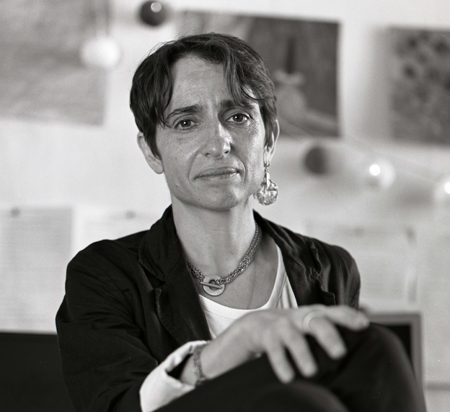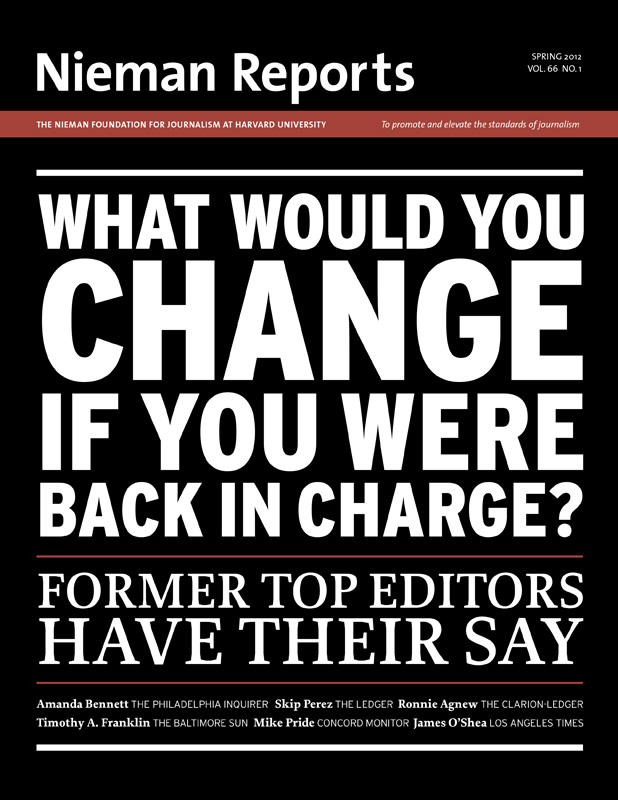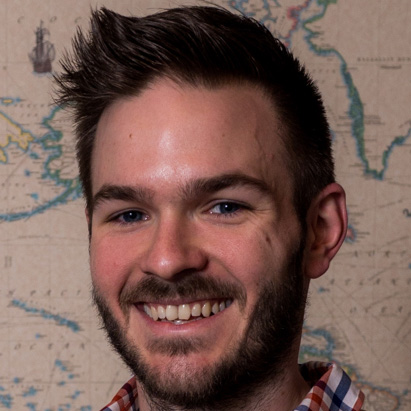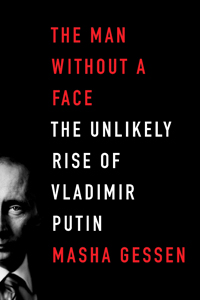
Masha Gessen’s new book is "The Man Without a Face." Photo by Svenya Generalova.
Russian-born Masha Gessen is very much a journalist and a citizen. In writing “The Man Without a Face: The Unlikely Rise of Vladimir Putin,” released by Riverhead on March 1, she draws on the chilling history she has lived. “Putin changed the country fast,” she writes, “the changes were profound, and they took easily.” For more than 12 years, she didn’t vote in parliamentary elections because Putin had rendered them meaningless. Last year, her hopes for a regime change revived, she helped organize anti-government protests. Gessen spoke with Nieman Reports’s Jonathan Seitz over Skype from her home in Moscow.
Jonathan Seitz: After reading “The Man Without a Face,” I came away with a view of Putin as vain and petty tyrant. He reacts to these fairly innocuous slates with these threats and the legitimate opposition tends to get worse, and he seems just to be constantly consolidating power. Is that the view you have after writing it or is there sort of more a nuance to it?
Masha Gessen: I think that’s basically right. I think one thing that is very important and that generally has been underreported in the West is just this incredible, insatiable greed that has become more and more prominent and more and more the motivating factor behind his decisions as he has gone on. So I think if his first term as president was really about consolidating power, then the subsequent eight years have actually been about consolidating wealth.
Obviously these two go hand in hand, but I would say that the stress is on both at this point.
You put forward in the book this idea of Putin’s pleonexia, his insatiable desire to have what rightfully belongs to others. Looking at the way he reacted with the Kursk submarine disaster and the sieges in Beslan and Moscow Theater do you think Putin is almost sort of like a sociopath or psychopathic kind of character?
My researcher suggested that very early on. His working theory is that Putin is a psychopath, but I’m not in the business of passing psychiatric diagnoses, especially on people I have actually never met personally. I think it’s as good an explanation as there is out there, but in a way it doesn’t matter. Not all psychopaths become tyrants, and certainly not all psychopaths kill people that they perceive as traitors or have the opposition to them running under constant threat of death and bodily harm. So I think in a sense once a person comes into government office, or at least until he has left government office, his personal psychiatry is beside the point. His behavior is what’s important.
On the subjects of threats and violence, one way I thought of reading this book was sort of as almost as a long form fact checking exercise, untangling all these different conspiracies where everyone has their own point of view of how things went down. How do you decide who should be believed when obviously everyone has some agenda in what they are saying?
What I hope comes across from the book is that in a way it doesn’t matter. The blame for the situation—for a country where people run the very real risk of falling outside of the law, having no protection and being killed—that blame lies with Putin and the system he has built. This is the system he has built. So in a way, the question of whether the order to have somebody eliminated came directly from him or whether it didn’t becomes secondary, right?
He has created a system that kills the differently minded. I find it interesting and important for the purposes of storytelling to tell some of the stories of these deaths and these attacks in some detail. These are obviously not all of the stories.
And I find it important to show where we can definitely point to Putin, where we can point to Putin personally with some probability, and where we really can’t do that, even though again I think that overall sort of the blame for creating this situation lies with Putin. So we end up with [Former FSB agent Alexander] Litvinenko’s murder as the only one where evidence— even without having a court decision or an investigation that has been open to the public—the evidence seems to point to Putin beyond any doubt.
Are we ever going to legitimately know the answer to these questions?
I hope so. That is obviously one of the most frustrating things about not only about writing a book like this, but also about living in this country, and also about living in this country after a regime change, which I hope will happen soon. We saw that happen in Ukraine where the Orange Revolution that took place in 2004 was in large part touched off by the murder of Georgiy Gongadze, a journalist who was found beheaded in the woods outside of Kiev.
I think there is an incredible amount of grief that seven years after the Orange Revolution there is still no clear picture of what happened to Gongadze. And I fear that may happen in Russia even after regime change. We’re probably not going to have a clear picture in a lot of these murders and a lot of these attacks.
A part of the reason is that it is a closed system. It is a system that is itself conspiratorially minded. It is not particularly likely to document its violence. But of course another reason is that if there is a peaceful transition there will probably be strings attached to it, and one of them will probably be impunity from prosecution.
You’ve written before about being blacklisted by Putin’s government in 2000 after a series of op-eds in The New York Times. Is that still in effect? Are you still barred from the Kremlin?
Yes, I am definitely not allowed into press pools, though I haven’t tried it in awhile. The last time was a few years ago, when I was asked to be part of a television talk show as a writer of popular science books.
So then the editor called me up and was terribly embarrassed and she said, “We couldn’t get you vetted. What have you done?” And I said, “Don’t worry. I have another career as a political journalist and it’s fine. Don’t be embarrassed.” But certainly there was a couple years ago I got confirmation that I am still banned from federal television shows.
So I assume then that nobody from the Putin administration had a chance to see the book beforehand or respond to anything in it?
No. In fact I actually thought it was important for my own safety that it not happen.
So what are you expecting as far as response in Russia when the book comes out and it is put out there in public?
Well things are changing fast, so I actually feel a lot safer now than I did a couple months ago. The original plan was for me and my family to leave the country just before going public with the book. And we decided—I decided not to.
And this was just a couple weeks before the protests started. So I’m actually very happy that I decided not to. I’d be mad if I were in the States now, but it’s really—what do I say? It’s a little ridiculous to be a living, breathing person and talk about a possible threat on your life. I am alive. Nobody has attacked me, thank God. I don’t expect to be attacked. I don’t harbor a death wish, but within considering everything I describe in the book, if I were my own editor, if I were my own mother I would have told them to get out of the country just to be on the safe side.
Is the book going to be available in Russia?
Well, that’s a good question because originally a friend of mine who is the editor of one of the better publishing houses contacted me after the Frankfurt Book Fair, where we went public with the book, and asked me to see the manuscript. I told her I would show it to her as a friend, not as an editor, just to get her opinion on whether this could possibly be published in Russia.
She got back to me a couple weeks later, said that she really liked the book and wanted to publish it. She had gone to her bosses to talk about it, and they said that they couldn’t put their business in jeopardy by publishing a book like this. And then she said I should leave the country.
When the protests started I asked her if she wanted to talk about it again. And she did. So it is under consideration again and this time we actually decided to go the official route, it’s no longer confidential. She is showing it to a couple editors at the house, and we are going to see if things have changed enough to get it through the regular distributing process. At this point I doubt it, but again things are changing fast.
If you can’t go through the regular process would you consider like online publishing or some way of it getting out to people there, distribution sort of through other means?
I don’t think so. Again, this partly paranoid and partly good sense, but we take our cues from one another. So they are too scared to publish the book; I should probably be too scared to publish the book as well.
A solid mainstream publishing house offers a little bit of protection to me as a writer—not physical protection but a kind of psychological protection, perhaps acts as a bit of a deterrent. Going out on a limb on my own to do an online publication is too much. Also I wouldn’t want to spend the time translating it into Russian myself.
As someone who’s reported in Russia for 20 years now, do you have important lessons, as far as facing censorship, and safety and other issues that you would pass along to other journalists?
As a journalist I have lived through several periods here, including the Golden period of the ‘90s when people were accessible, information was accessible, archives were accessible and everything was new. It was an incredible time to be a journalist. And I still feel very privileged to have been able to work at that time.
I think that one lesson for any journalist working in a closed society and basically in an authoritarian society like this is it’s a little bit like a war zone in that you have to get out regularly to keep your head on straight. I have been a war reporter and I believe deeply that you have to get out every couple weeks just to make sure that you don’t start taking on unnecessary risks, and that you continue to do your job as journalist without over-identifying with any one thing or at least not doing it unconsciously.
I fully believe in activist journalism. And so I am not speaking the standard objectivity line, but I think that if you do choose sides as a journalist, you have to make a conscious choice and not have it be a psychological trick that’s played on by circumstances in which you find yourself. I think that happens in an authoritarian society because what you face all the time is people saying something that you think you believe not to be true. It does get under your skin after awhile.
I’ll give you an example:
There is man I interviewed for the book Ahmed Zakaev, who was a Chechen government official and has been living in exile for the last nine years. When he first left Russia he was arrested in Denmark on a Russian extradition request, held for ten days or so before Russia was denied extradition and he was released.
I was writing about it in Russia at the time, and I was visiting a friend in Sweden a few days after he was released. The friend, a journalist, was saying ‘I can’t believe the Danes did that with Zakaev.’ And I thought, ‘My God, how could she possibly think that the Danes should have extradited Zakaev?’
I thought she meant that she couldn’t believe they failed to extradite him, which I thought was really gross. But it turned out what she meant that she couldn’t believe they arrested him at all. What I realized was that my frame of mind had shifted to where I didn’t think he should be extradited, but I also failed to question their right to arrest him on a Russian extradition request. I was in a different point of the debate having been influenced just by official Russian propaganda.
I still thought of myself as somebody who thought differently. And I still thought of myself as somebody who didn’t agree with the Russian government or with the Russian prosecuting general’s office that, but it didn’t occur to me that I had already moved to where I thought it was okay to arrest an innocent man for ten days because the Russians had put what was clearly a bogus extradition request.
What I’m trying to say is that the lines shift, and you don’t notice them shifting unless you check out once in awhile for a decent period of time.
For instance, doing something like a Nieman fellowship and getting out for a year.
Exactly, exactly. Actually I spent a year in the Nieman fellowship and then I spent another year at Harvard four or five years later at the Davis Center on a fellowship, and I think both years were essential for my sanity.
If I can address something else from the book, there is one point where you are critical of the U.S. media for the way it reported Putin’s rise to power and the way he rolled back reforms. You wrote that it was the world’s most influential media and they were asleep at the wheel. You explain to some extent that a lot of that had to do with the Bush/Gore debates in 2000 and other pressing matters in the U.S., but are there any suggestions you have for how American journalists can better cover Russia?
One thing that I realized after finishing the manuscript was that American journalists are still behind the curve on the story, and very much behind British journalists on Russia because they really have not covered the incredible extent of corruption and the consolidation of wealth by the Kremlin. That is a very, very important failure because I am convinced that it’s what’s principally motivating the protests now. So I think that American journalists are not doing a great job of explaining to their readers why hundreds of thousands of people, or even tens of thousands of people, are coming out into the streets because they really haven’t covered the corruption story as well as they should.
I think that part of the problem with the coverage of Russia is the reliance on a few pundits who shift positions much faster than they would in a more stable society. Somebody who becomes a standard talking head in a country like the United States has every chance of remaining well informed, and as biased or unbiased as they are today, for 10, 20, 30 years, whereas in Russia people who had no connections with the Kremlin—and were perceived rightly as independent commentators—fall into bed with the Kremlin and continue to be perceived by the U.S. press as independent commentators for years. Other people just wind up outside the loop for perfectly good reasons, like not falling into bed with the Kremlin, but they just don’t have the kind of access to information that you need to be able to tell foreign reporters what’s going on. So, over reliance on pundits who are not very reliable, and lack of turnover among pundits.
I think there is also a very peculiar problem in the U.S. press, which is that Russia is such an important posting that a lot of people who end up editing the Russian stories back in the U.S. once served as Russian bureau chiefs as well. They think they understand Russia, but they don’t realize that the country has changed cardinally in just two, three or four years.
I think I’ve seen a lot of examples of that. It’s an easy trap to fall into. I’ve been back in Russia for 20 years, and I think I lost my ability to write about America after maybe about 10 years of living here. But I still I think do a pretty good job of explaining to my Russian friends what Occupy Wall Street is because it’s enough to read the papers, to listen to podcasts, to read my brother’s blog, and to be able to get the idea, because the United States is basically an informationally healthy society, in which information travels and trickles up from the Internet into the mainstream media and down back into the blogs. You can get a fairly well rounded idea of what’s going on even if you’re not in physically in the street.
That’s just not true in a country that is informationally atomized like Russia is, and that is at the same time changing very fast. Once you sever the umbilical cord you are just not getting that information anymore. And that’s something that editors have a hard time keeping in mind because they were Moscow bureau chiefs three years ago or even ten years ago, and they think they get it.
Coming back to the protests in Russia, the sense I got from the epilogue in your book was that a lot of the organizations happen through Facebook and social media, kind of like what’s been happening with the Arab Spring. Do you see social media in Russia as just an organizing tool? Or is it sort of an inherent instrument of change in a way?
That’s the big question of our age I guess. I was, like many people, caught completely unawares by the force of Facebook. I wouldn’t say that I was caught completely unawares by the protests. I was pessimistic about the possibility that something would happen, but I did feel like the country had lost its sort of marsh-like stability in the last year or so. So I felt like something was in the air, but I had no idea that Facebook and other social media were going to become such effective instruments so fast.
I have generally been on Evgeny Morozov’s side of the debates, that the Internet is an instrument and that like a gun it can be used by the good guys and by the bad guys. And you can never tell who is going to be a better shooter.
For most of the last few years I’ve actually held an even more radical view that the social media in Russia reflected the very unhealthy nature of the flow of information in Russian society, where the blogosphere was as atomized as society itself was. Offline, people didn’t have connections from one social strata to another, from a circle with one set of political beliefs to a circle and another set of political beliefs. It was the same way in the social media. You just couldn’t get there from here.
That still holds true to a large extent. That’s become clear in the last months since I’ve more involved in the organizing. For example, there is a Russian equivalent of Facebook, and it has almost no connection with the English language Facebook platform. They are two completely unconnected social networks that have a similar interface, are used for similar purposes, but by two completely different huge groups of people, over a million in each network.
So even the groups that are doing organizing on Facebook and on Vkontakte, which is the Russian network, are totally disconnected. This does not work.
Another thing that’s also become clear since I wrote that book is that about half the people who came to the last protest—the biggest yet, on December 24th—about half of them did not get their information from social networks, from social media. Somehow or other they got that information offline.
I actually ran most of the offline leaflet and poster info. We did a lot of that, but there were a lot more people there than could just seen the posters or the leaflets.
You seem very hopeful about the future of Russia, and that regime change is coming.
I don’t think it’s possible to predict the exact mechanism of change, again because it’s such a broken society. But I do believe that once a system like this—which is so rigid that it’s inherently fragile— that once it’s destabilized it cannot hold on for very long.
It may be a matter of months. It may be a couple years, but it’s going to collapse. It just lacks the flexibility that is necessary for long-term survival. And I can say that I hope it will happen sooner rather than later.
You’ve written previously about math genius Grigori Perelman, and before that about the human genome and cancer. So you’ve covered impenetrable subjects before, but is there something different when you’re writing about someone like Putin who is both so public and yet so unknown?
The biggest difference for me with the Putin book was that for the first time I was—this is an odd thing to say about what was essentially a biography of somebody I clearly didn’t like very much—but in a way I was writing the story of my life. It was so integrated into what I have been living for the last twenty years that some of it was less of discrete subject than Grigori Perelman or medical genetics. I don’t think it’s much of a personal book, but I think in some ways it was similar to writing a memoir.
Do you have ideas about what your next book is going to be?
I’m bouncing two ideas around, but actually and the book I really want to do next my publisher isn’t yet sold on. So I don’t know if I should tell you about it, but it’s a history of Russia in seven love story, because I think Russia is a country that’s been, whose history has been shaped to a very large extent by things that people do for love. And I’d love to write in seven novellas at first like both Russia’s sort of exalted attitude toward love and the things that they allow themselves to do that shape human history.
I think it would be a great book to write and I hope it will a great book to read, but with all the political stuff going on it might be a little bit soft.
Masha Gessen, a 2004 Nieman Fellow, is the editor of Vokrug Sveta science magazine and editor in chief of its publication house.




